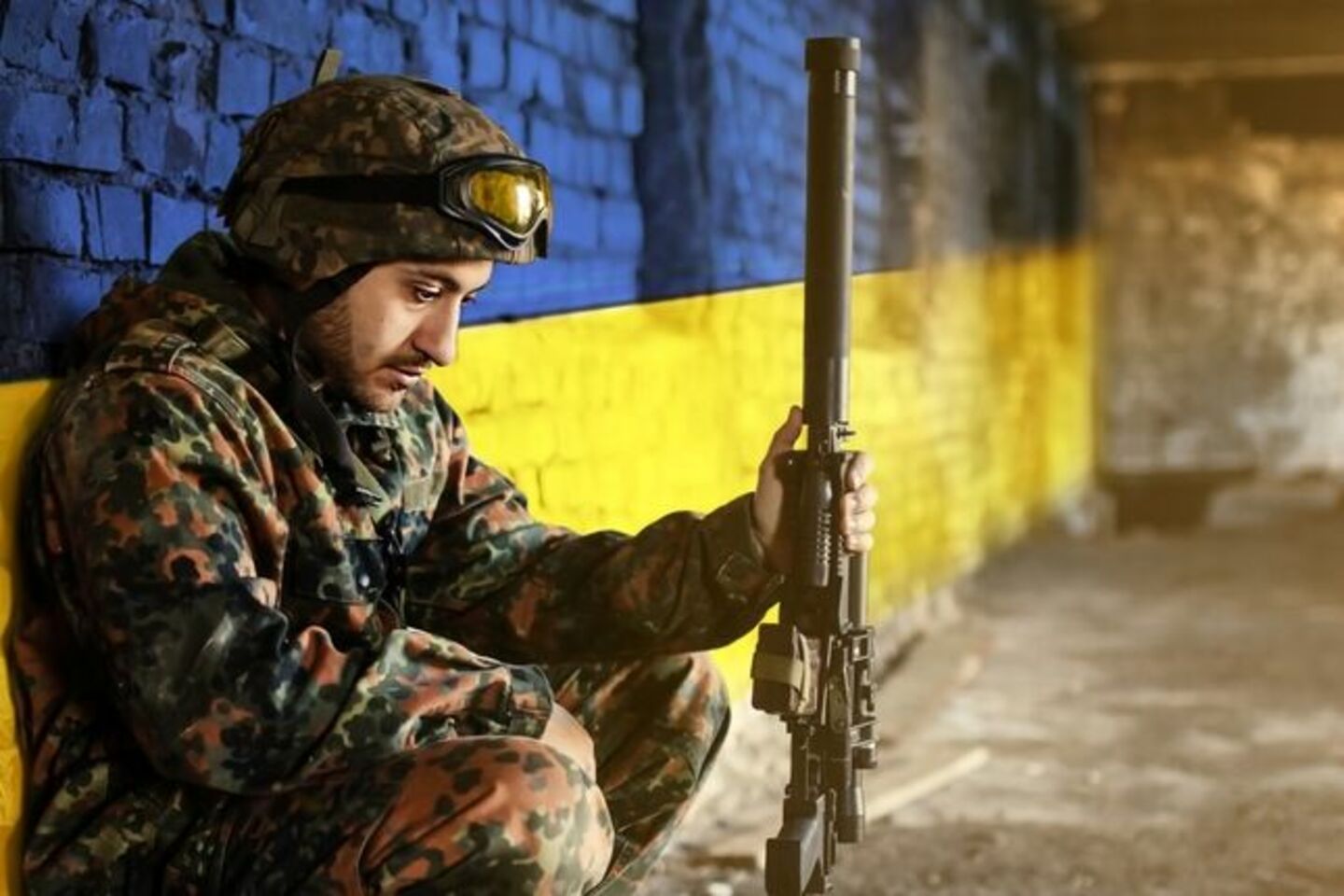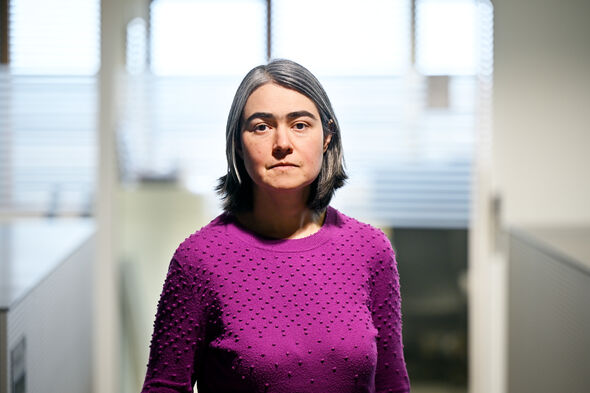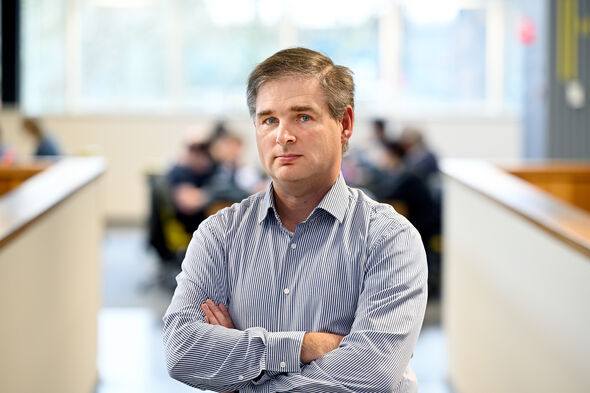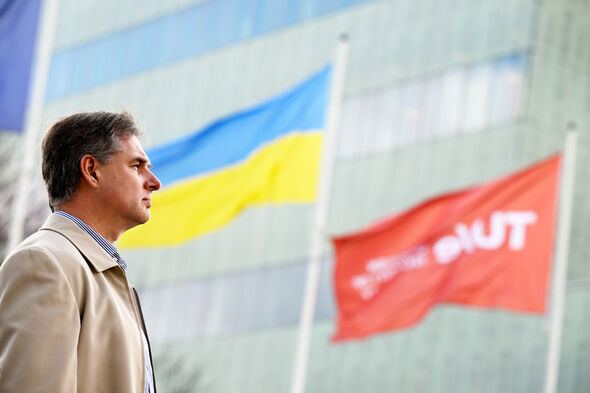
Keep hoping for peace
TU/e scientists from Ukraine looking back on one year of war
For a year now, the war has been going on in Ukraine, the homeland of associate professor Sveta Zinger and professor Mykola Pechenizkiy. The urgent wish that Zinger expressed in an interview with Cursor a year ago – "we need peace now" – has not come true. Still, that's what she continues to hope for. Pechenizkiy hopes for Putin's fall in the foreseeable future and praises the intransigence of the Ukrainian people. Two conversations in which emotions naturally also play a major role.
In an interview with Cursor a year ago, associate professor Sveta Zinger expressed her hope that peace would soon come to her home country of Ukraine. It didn't happen, but she still hopes for it, even if she's so realistic that she doesn't see it happening anytime soon. “The messages on the subject I receive from Ukraine don’t instill me with a lot of optimism. I hear the Russians are digging trenches, also in Crimea, and there’s a big frontline running straight across the country. And the longer the war goes on, the more we see of the animalistic aggression the people are facing. There’s violence everywhere and it affects everyone, including women and children.”
Her city of birth Dnipro was bombed in several places last 14 January. A nine-story apartment building was one of the structures that was almost completely destroyed. Zinger: “When this building was hit, I was just talking on the phone to my father, who stayed there. At this point in the war, a lot of people no longer go to the bomb shelter when the air raid alarm sounds, because it does so all the time and it’s generally a false alarm. Plus, there’s only a limited number of places you can seek shelter. My father just continued talking to me when the alarm went off, but suddenly he heard a huge explosion, which according to him sounded completely different from the anti-aircraft guns the Ukrainian army uses to take out missiles and drones. It turned out to be that building being struck. If you look at footage, you can even see a child sitting amidst the rubble really high up.”
Picking up father
Zinger’s father – her mother died a few years ago – has his own company, which is his reason for staying. “At the beginning I tried to convince him to come to the Netherlands,” Zinger tells us. “My husband was supposed to drive out to the Polish border to pick him up, but he decided to stay put. He delivers aid to people, including those who work for him, but he also helps in other ways, for instance by distributing medicine to certain places.” Zinger obviously worries about this. “A missile hit about a hundred yards from where I grew up. Back in Soviet times, a KGB office was located there, so that might be the reason. But they ended up hitting a large building that mostly houses stores.”
Zinger has tried to help her native country in a number of ways, for example by collecting all kinds of items in the first months, but she says it’s hard because a lot of services, including the mail delivery system, don’t function well anymore. She’s still in touch with friends, some of whom have left Ukraine. “A friend that was pregnant at the time of the invasion left Kyiv for Zürich. Her child was born too early and she’s plagued by nightmares about gunfire.”
Read on below the photo.
According to Zinger, there’s no doubt the war with Russia brought about a widely shared sense of unity. “Before, there was a division between the pro-Russian part of the people and the part that was against everything Russia stands for. You saw this everywhere, including in the media. Now everyone feels closely linked to Ukraine, no matter if they’re originally Russian or Polish.”
All of this doesn’t mean she can’t sympathize with the situation of her Russian family and friends. “Fear reigns in Russia. Criticism of Putin or the war is not tolerated and any protests are crushed. If you wanted to be cynical, you could say Russia is now the northernmost part of the totalitarian state of North Korea. The whole situation fills a Russian friend of mine with shame and distant relatives can’t believe what happened. At the start of the war, they thought it was a bad joke. Incidentally, if you live in Moscow, you’re not affected by the war. Life simply went on there, there’s still light, art and peace. Also, a lot of critical Russians left the country, which actually suits the authorities fine.”
Consolidating power
Zinger doesn’t know how the conflict will develop from here on out. She thinks Putin – a name she has difficulty saying aloud – is in fact worse than Stalin, to whom he’s often compared. “Horrible as Stalin’s acts were back then, you can at least say that he had a certain vision, that he was trying to build something. With Putin, there’s no vision and it’s all about consolidating his power. Which is why he can’t back down anymore: he’s a prisoner of his own power games.”
Even in the safe haven that is the Netherlands, Zinger experiences the consequences of the war fought hundreds of miles to the east. “I sometimes get a feeling of anxiety and imagine I hear the sound of the killer drones Russia uses in Ukraine to bomb targets. It’s hard for me to say what should be done next. I’m not in a trench defending the country. Those that are, are entitled to an opinion. Whenever I enter the campus and see the flag of Ukraine flying at the pond, I find myself wishing it would disappear as soon as possible. Because if it does, it means the war is over. I keep hoping for that with all my heart.”
I sometimes get a feeling of anxiety and imagine I hear the sound of the killer drones Russia uses in Ukraine to bomb targets.
Role of Zelensky
Up to a year ago, Professor Mykola Pechenizkiy, who works at Mathematics & Computer Science, had not expected Zelensky to become the prominent head of state of his native Ukraine. But he does think the former comedian and actor taking on this role with such gusto and the perseverance of the Ukrainian people have been crucial in withstanding the Russian army when it invaded the country out of the blue a year ago.
“Let’s be honest though, the Russians were very close to victory at the time,” Pechenizkiy says. “They were in the outskirts of Kyiv and my place of birth Kharkiv and had started a large-scale offensive in the south. So, in that sense Putin’s and West’s assessments of the situation weren’t entirely wrong, but luckily Putin and his military simply underestimated the fighting spirit of the Ukrainian army and people.” Now, a year later, he looks back with mixed feelings, “because it brought the people a lot of fear and pain, but there’s also a great sense of unity, dignity and pride about the accomplishments in the weeks and months after.”
Political nation
He says Ukraine is a political nation. “It’s not about your exact location within the country, ethnicity, daily language or about religion, it’s about the values you want to share with each other. Ukraine was a divided country, but it wasn’t as bad as the media made it out to be. Often that was just pure Russian propaganda, aiming at Ukraine, at Russia and even more so at the rest of the world. And it was rather effective. Even the annexation of Crimea and Russia’s invasion in the Eastern regions of Ukraine did not change it. The war as it escalated in 2022 brought change: everyone feels Ukrainian now. Many Ukrainians who spoke mainly or only Russian before, now prefer to speak the Ukrainian language.”
Pechenizkiy does not put a lot of stock in claims that a large part of the Russian people are kept in the dark about the war. “Hardly anyone can use that excuse, as there are plenty of ways to find out what’s going on. So are people simply too afraid to go against Putin and his regime? I don’t doubt some are, but I also think there are a lot of Russians who support the war because they agree with Putin’s mythos about Ukraine and about the world."
Read on below the photo.
Pechenizkiy also knows people that were wounded or killed over the past year. About the state his native country is in at the moment, he says: “You can either see the glass as half empty or half full. I choose the latter, the sufferings of Ukrainians are enormous, but the counterfactual world, in which Ukrainian would not fight to defend their freedom and democracy, is unbearable. What Ukrainians feared from Russia’s genocidal rhetoric, the whole world could witness during the first weeks of invasion. Ukraine stands, and if you look at what’s still functioning in spite of everything, it’s quite a lot: the postal service, the roads, the railway system, energy infrastructure – even the powerplants that are regularly bombed are up and running again.”
In the first weeks of the war, he mainly assisted remotely in getting woman and children in areas under threat out of the country. He is very positive on the shelter offered by the Netherlands, “as well as the collection and shipping of all kinds of supplies to the Ukraine and the military support."
Pechenizkiy had hoped for more willingness to act and creativity from the academic world. “If you look at the huge amount of young people who came or would consider moving to the Netherlands, we could have done a better, more carefully considered job in giving them a place within education or internships with industry, particularly in the booming Brainport region. I elaborated some concrete plans to this end, thinking we could even do it in an affordable or even budget-neutral way, but in the end they turned out to be difficult to realize which is especially sad since the refugees from Ukraine include many young educated women, who want to study further and contribute to knowledge economy – exactly the group we would like to appeal to and draw to our beta programs.”
Turning his gaze toward the future, Pechenizkiy is convinced that Ukraine will stand, and that Rutin’s Russia will be defeated, but it’s hard to say when this moment will come. If things play out like that, Pechenizkiy says “I do hope that results in a better world, including all current and future democracies. That holds for Russia too. Russia becoming a non-nuclear state over time would be the ideal scenario in my opinion. Whether that’s realistic? I hope so. With all the support of the free world and its unity with Ukraine, Putin’s constant escalations lead only to further strengthening of Ukraine and weaking of Russia. And who knows, he may be gone in a few months’ time.”
Ukrainian students at TU/e
When Russia invaded Ukraine a year ago, TU/e also opened the gates to Ukrainian students who wanted to study here. For them, the tuition fee was equated with what Dutch students and students from the European Economic Area (EEA) have to pay: 2209 euros. According to Jacobi Mulder of Education and Student Affairs, there are currently thirteen Ukrainian students who have their main enrolment at TU/e and seven of them have started this academic year. Cursor also asked how many Russian students are currently studying at TU/e. According to Mulder, there are 36, of which 12 started this academic year.
Jim Bergmans, policy officer at ESA, says that since March last year, all kinds of help has been provided "to our Ukrainian and Russian students in these difficult times. You can think of an emergency fund for students in acute financial need for a one-off amount of 750 euros per student and of postponement of and leniency in the payment of tuition fees. One Ukrainian and one Russian student have appealed to the emergency fund. That's a gift, by the way. Three students have asked for leniency in paying the tuition fees. They can also participate in TU/enable, a programme that gives refugees the opportunity to participate in a number of bachelor's and master's courses free of charge. In addition, refugees who are not registered as students can use workplaces, laptops and sports facilities for free on campus and they can follow free online education from TU/e, for example at Euroteq."
The government has not yet taken a decision on the exact amount of tuition fees for students from Ukraine for the coming academic year.




Discussion